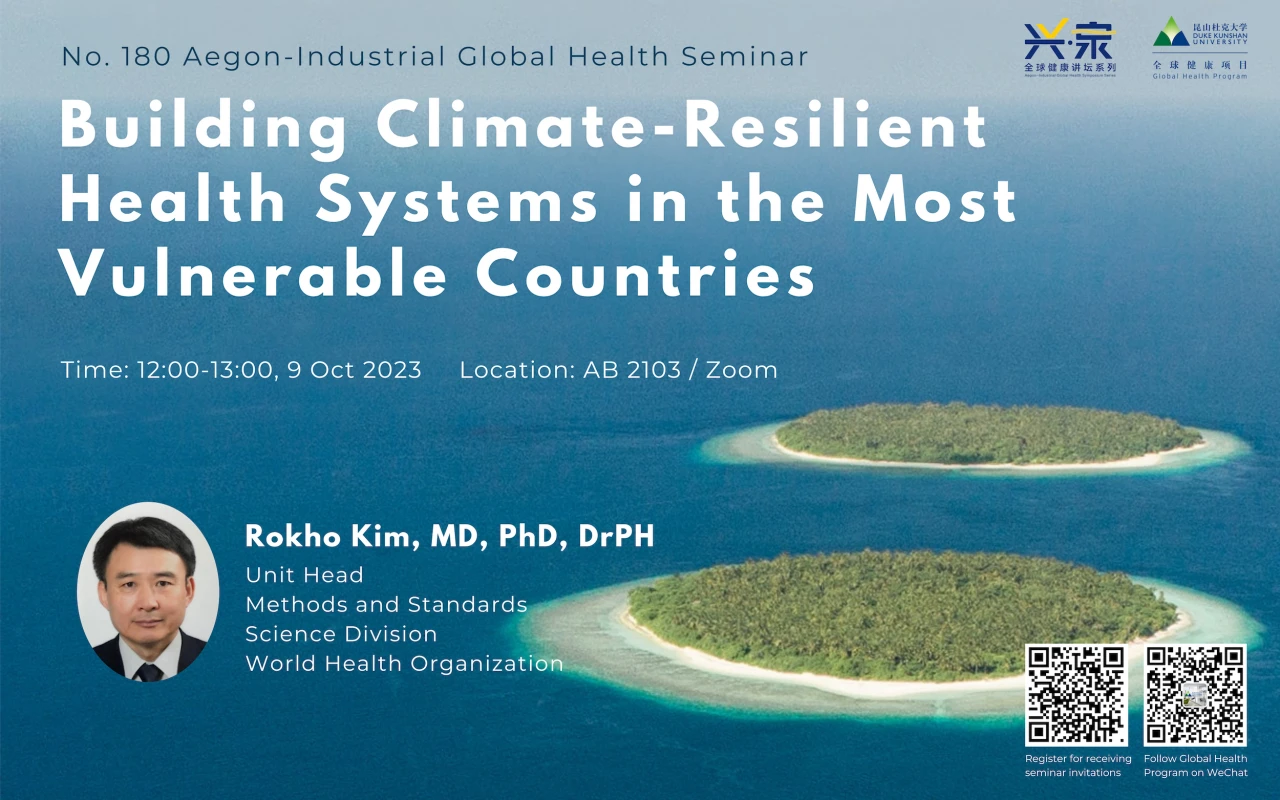
第180场兴泉全球健康系列讲坛
内容概要
The climate crisis is, unequivocally, a health crisis. Climate change significantly threatens the health of global populations, with Small Island Developing States (SIDS) and Least Developed Countries (LDCs) being the most affected. Pacific island countries (PICs) have long been struggling with the compounded challenges of communicable diseases, non-communicable diseases, and climate change-induced health threats, resulting in high morbidity and mortality rates. In response, WHO and UNDP have initiated a five-year project, co-funded by the Global Environmental Facility (GEF) and governments of Kiribati, Solomon Islands, Tuvalu, and Vanuatu. The project’s primary goal is to build the resilience of local and national health systems against climate-induced health risks in these Pacific LDCs. Key strategies encompass: Strengthening governance and policy integration regarding climate risks; Enhancing the capacity for health information and climate early warning systems; Boosting the quality and reach of health services, while minimizing climate-induced health facility disruptions; Encouraging south-south cooperation for knowledge exchange, technical assistance, and policy integration. Launched with a meeting in Suva, Fiji, in July 2023, the project benefits from a substantial US$17.85 million in funding from GEF, marking it as one of the most significant health resilience investments in the Pacific. Global health researchers are encouraged to prepare proposals to for a cohort study to assess the direct and indirect impacts of climate change on health and health systems in PICs. Such studies will provide critical evidence about climate-induced health outcomes, validate the effectiveness of the investments in adaptive measures and climate-resilient health development, and inform global climate financing mechanisms to protect the populations in the most vulnerable countries from climate impacts.
讲者介绍
Dr. Rokho Kim is a medical doctor and epidemiologist. He graduated from the Seoul National University College of Medicine in 1982, and Harvard University School of Public Health (Doctor of Public Health) in 1995. In 1995-2003, he taught Epidemiology, Toxicology, Environmental and Occupational Health as Assistant Professor of Seoul National University and Adjunct Assistant Professor of Harvard University.
In 2003, Dr. Kim joined the WHO Europe as Scientist at the European Centre for Environment and Health in Bonn, Germany. He led the publication of technical publications such as Environmental Health Indicators for Europe, Night Noise Guidelines for Europe, Environmental Burden of Diseases from Environmental Noise in Europe, and Environmental Health Indicators for European Children.
In 2013-2017, he was appointed to Environmental Specialist of WHO South Pacific Office in Suva, Fiji. He produced the WHO report on Human Health and Climate Change in Pacific Island Countries in 2015. He developed a five-year project with US$17.85 million for four countries in the Pacific to build climate-resilient health systems, funded by the Global Environment Facility.
In 2017-2020, Dr. Kim was appointed as Coordinator, Health and Environment (HAE) of WHO Western Pacific in Manila, the Philippines. He led WHO’s work on global health issues including Air Quality, Climate Change, Water and Sanitation, and Occupational Health serving 36 countries of the Region. He prepared Report on Air Quality and Health in the Western Pacific Region, and Towards Universal Occupational Health Coverage in the Western Pacific. He led the project of establishing the WHO Asia-Pacific Centre for Environment and Health in the Western Pacific Region in Seoul, Korea.
Since Feb 2020, Dr. Kim has been serving as Unit Head, Methods and Standards, Quality Assurance Norms and Standards, Science Division of WHO Headquarters in Geneva. His team is developing and implementing WHO-wide Quality Assurance System to strengthen WHO’s normative work for impacts.
Dr. Kim received “Albert Schweitzer Award” by Harvard University in 1995 for his advocacy work for the vulnerable populations. He has been a fellow of the Collegium Ramazzini since 2013.
要注册此活动请将您的详细信息发送至 chu.ren@dukekunshan.edu.cn

© 2025 Duke Kunshan University 苏ICP备16021093号